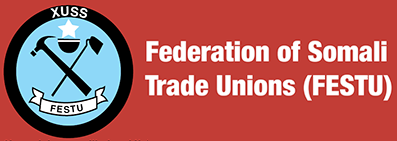The Federation of Somali Trade Unions (FESTU), its 12 affiliated trade unions and working people of Somalia applaud the developments of Thursday, 30 July 2020, where the Council of Ministers unanimously approved 5 eminent persons to be considered for appointment as members of the Judicial Service Commission (JSC) in the belief that it shall enhance the administration of justice, expeditiously select judges for constitutional court and enhance the administration of justice and strengthen the judiciary’s capability to effectively deal with case backlog.
Though long overdue, the nomination of members of the Judicial Service Commission (JSC) signals a breath of fresh lease of life into the institution of the Judiciary. It is no secret that for a very long time, the institution of the Judiciary has been crippled by a multitude of factors rendering it inefficient in the performance of its constitutional mandate of administering justice to the citizens of Somalia. Chief amongst challenges this institution continued to face is absence of functioning JSC and understaffing of judicial officers who are at the forefront of administering justice.
The absence of the Constitutional Court spells negative for the dispensation of justice and undermines the objective of the judiciary to dispense its constitutional mandate. The deep shortage of competent and incorruptible judges has nearly crippled operational capabilities of courts, almost rendering the institution of the judiciary ineffective from a service delivery perspective.
FESTU and its affiliated unions have made several calls over a long period of time to the appointing authority to expeditiously fill the existing vacancies in the Judicial Service Commission so that it is properly established.
Organised labour implores the members of the JSC to effectively carry out their Constitutional mandate to dispense justice to the citizenry with utmost fairness in sync with the laws of the land and Somalia’s international human rights obligations.
Though this is a positive step taken in the right direction, trade unions still continue to take note of the fact that these nominations for appointments are merely a drop in the ocean. The appointment processes of Constitutional Court judges ought to be made more procedurally transparent so as to build more credence, acceptability and legitimacy for persons holding these positions.
The selection process of judges must move away from head-hunting and nominations by allowing applications from all persons seeking judicial offices. The process must take into consideration the quality of the persons in character and values and must not rest more emphasis on the academic qualifications.
Trade unions call upon the Judicial Service Commission (JSC) to ensure detailed and standardized criteria of appointment for judges be made known to the public. Particularly, nominations for appointments of Constitutional Court judges should be based on merit, also taking into consideration the integrity, character and attitude of those seeking judicial offices. A clear, merited and competence-based criteria for assessing candidates must be developed to ultimately restore acceptability and dignity of the institution of the Judiciary.
These nominations for appointments of members of the Judicial Service Commission comes in with a huge measure of responsibility and high level of expectations for enhanced performance and accountability from the general citizenry on whose behalf the judiciary exercises its power of administering justice.
Therefore, Somali workers and their organisations expect the institution of the judiciary to take these nominations for appointments with great measure in its stride to improve on the administration of justice from a service delivery perspective across the country.
Finally, trade unions call upon the Federal Government and the Federal Parliament to support the Judicial Service Commission, by giving the judiciary a measure of administrative and financial autonomy as specified in the Provisional Constitution of Somalia.
